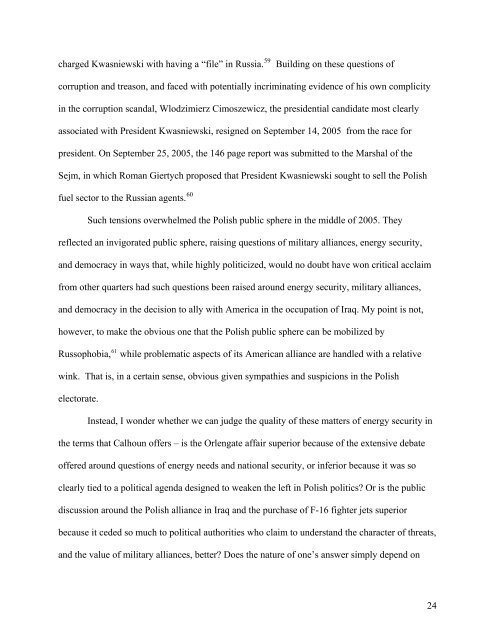from transition to hegemony - The Watson Institute for International ...
from transition to hegemony - The Watson Institute for International ...
from transition to hegemony - The Watson Institute for International ...
Create successful ePaper yourself
Turn your PDF publications into a flip-book with our unique Google optimized e-Paper software.
charged Kwasniewski with having a “file” in Russia. 59<br />
Building on these questions of<br />
corruption and treason, and faced with potentially incriminating evidence of his own complicity<br />
in the corruption scandal, Wlodzimierz Cimoszewicz, the presidential candidate most clearly<br />
associated with President Kwasniewski, resigned on September 14, 2005 <strong>from</strong> the race <strong>for</strong><br />
president. On September 25, 2005, the 146 page report was submitted <strong>to</strong> the Marshal of the<br />
Sejm, in which Roman Giertych proposed that President Kwasniewski sought <strong>to</strong> sell the Polish<br />
fuel sec<strong>to</strong>r <strong>to</strong> the Russian agents. 60<br />
Such tensions overwhelmed the Polish public sphere in the middle of 2005. <strong>The</strong>y<br />
reflected an invigorated public sphere, raising questions of military alliances, energy security,<br />
and democracy in ways that, while highly politicized, would no doubt have won critical acclaim<br />
<strong>from</strong> other quarters had such questions been raised around energy security, military alliances,<br />
and democracy in the decision <strong>to</strong> ally with America in the occupation of Iraq. My point is not,<br />
however, <strong>to</strong> make the obvious one that the Polish public sphere can be mobilized by<br />
Russophobia, 61 while problematic aspects of its American alliance are handled with a relative<br />
wink. That is, in a certain sense, obvious given sympathies and suspicions in the Polish<br />
elec<strong>to</strong>rate.<br />
Instead, I wonder whether we can judge the quality of these matters of energy security in<br />
the terms that Calhoun offers – is the Orlengate affair superior because of the extensive debate<br />
offered around questions of energy needs and national security, or inferior because it was so<br />
clearly tied <strong>to</strong> a political agenda designed <strong>to</strong> weaken the left in Polish politics? Or is the public<br />
discussion around the Polish alliance in Iraq and the purchase of F-16 fighter jets superior<br />
because it ceded so much <strong>to</strong> political authorities who claim <strong>to</strong> understand the character of threats,<br />
and the value of military alliances, better? Does the nature of one’s answer simply depend on<br />
24
















